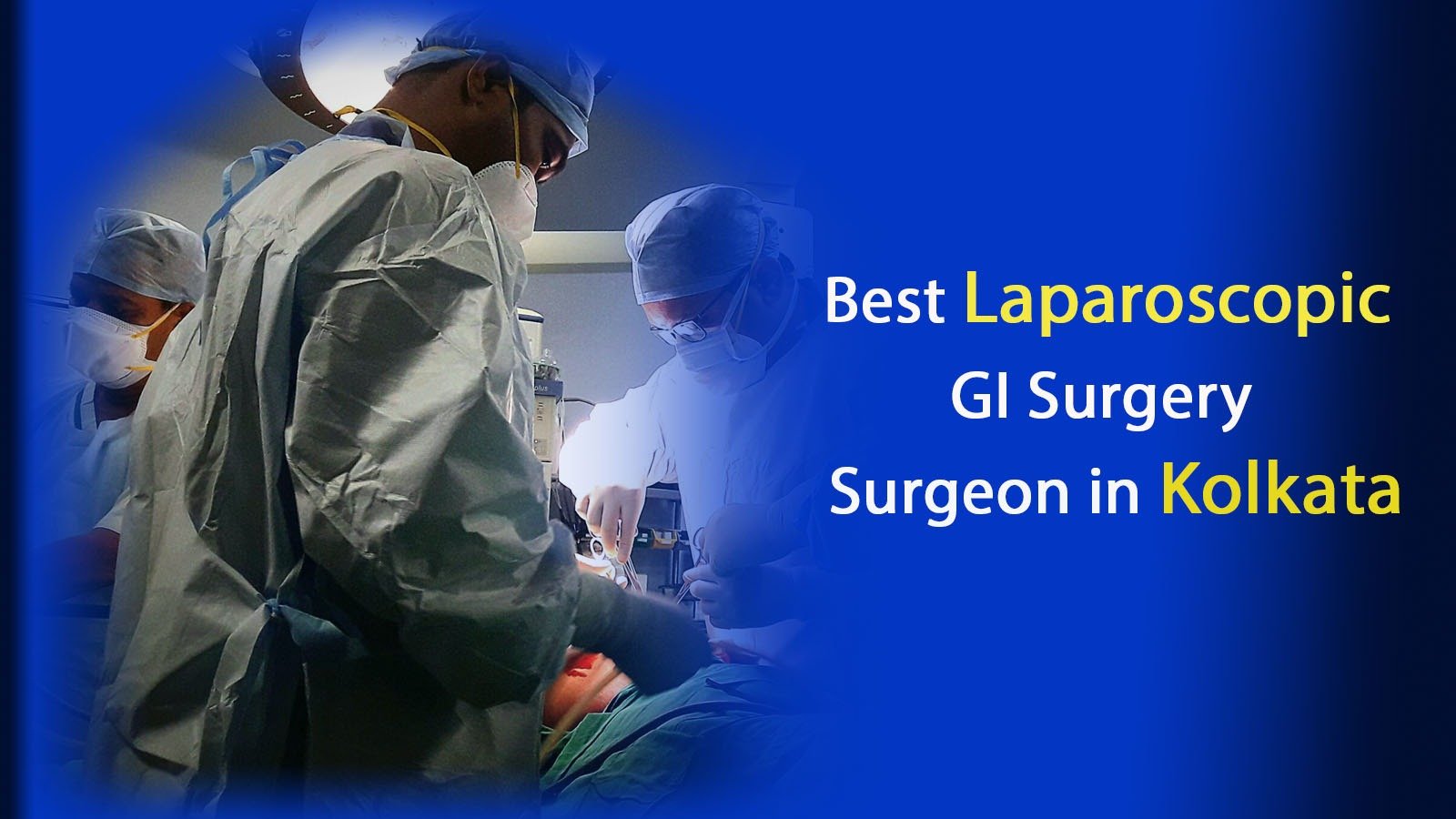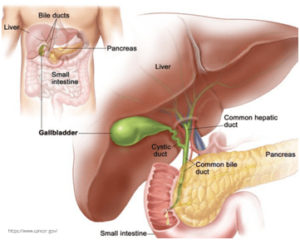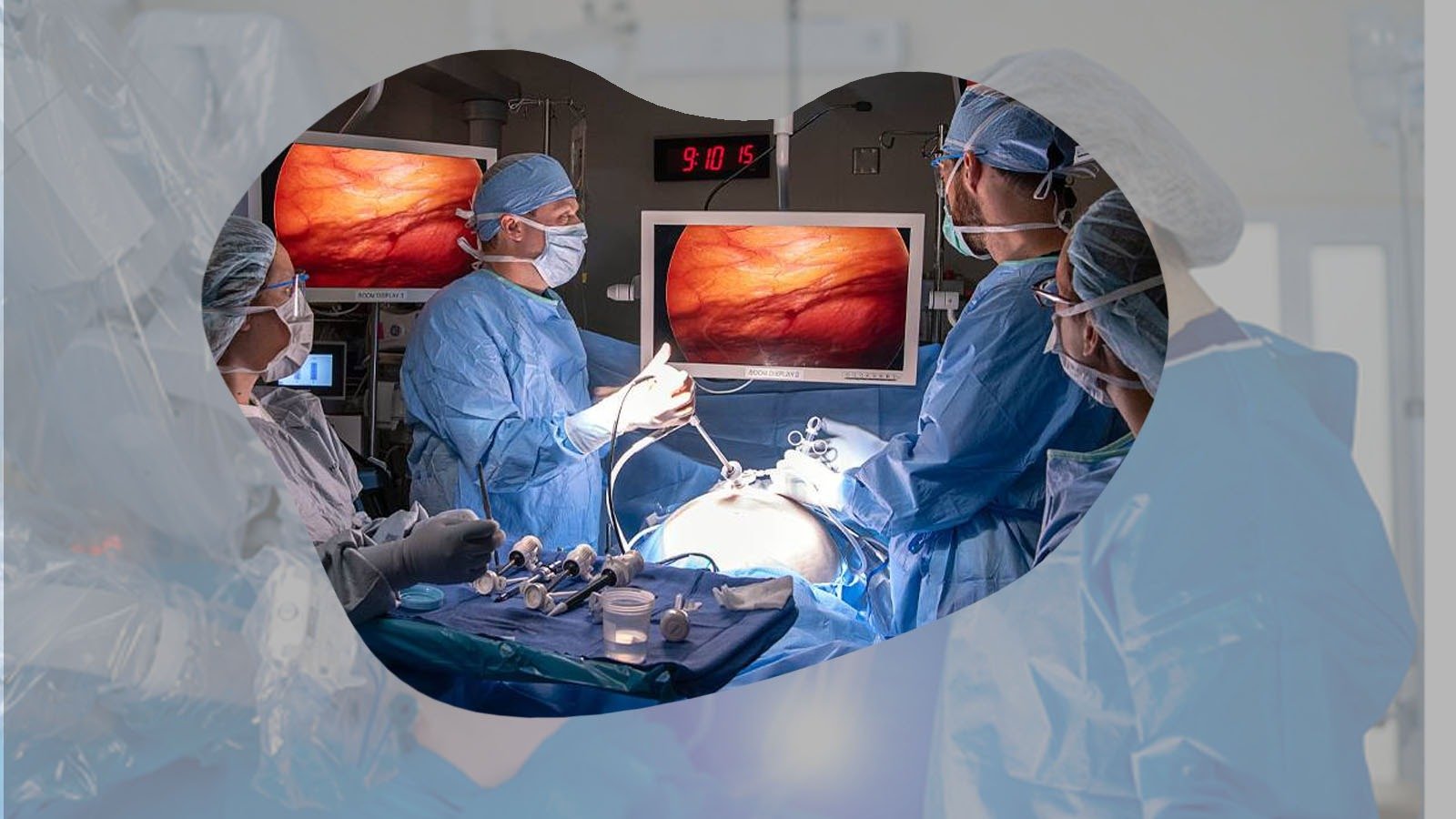Introduction:
Laparoscopic gastrointestinal (GI) surgery stands at the forefront of medical innovation, offering patients a transformative approach to traditional surgical interventions. In this extensive exploration, we embark on an in-depth journey through 20 crucial topics, unraveling the history, advantages, and complexities of laparoscopic GI surgery.
Dr. Pallab Saha stands prominently as one of the best Laparoscopic GI Surgery Surgeon in Kolkata, recognized for his exemplary skills, expertise, and unwavering commitment to patient care. With a distinguished reputation in the field of gastrointestinal surgery, Dr. Saha has earned the trust and admiration of both patients and peers.
His proficiency in Laparoscopic GI Surgery, coupled with a compassionate approach, has made him a sought-after surgeon in Kolkata. Dr. Pallab Saha’s dedication to staying abreast of the latest advancements in laparoscopic techniques reflects his commitment to providing patients with state-of-the-art and minimally invasive surgical solutions.
Known for his precision in complex cases and a patient-centric philosophy, Dr. Pallab Saha has become a beacon of excellence in the medical community. His contributions to the field have not only elevated the standard of care but have also positively impacted the lives of those seeking Laparoscopic GI Surgery in Kolkata.
Patients consistently commend Dr. Pallab Saha for his personalized care, ensuring that each individual’s unique needs are addressed with the utmost attention. As the best Laparoscopic GI Surgery surgeon in Kolkata, Dr. Saha continues to be a source of trust and reliability, guiding patients through their surgical journeys with skill, empathy, and a commitment to optimal outcomes.
Phone:- (+91) 9830088321
E-mail:– drpallabsaha1@gmail.com
Address:- 220, Ostad Amir Khan Sarani, Haridevpur, Kol-700082
The Average Cost of Laparoscopic GI Surgery in Kolkata
- The type of surgery: Different GI surgeries have different levels of complexity, which can affect the cost. For example, a simple laparoscopic appendectomy will typically be much less expensive than a complex laparoscopic pancreaticoduodenectomy.
- The surgeon’s experience and expertise: More experienced and highly qualified surgeons will typically charge more for their services.
- The hospital or clinic where the surgery is performed: Hospitals with more advanced facilities and technology will typically charge more than smaller hospitals or clinics.
- The patient’s individual medical condition: Patients with more complex medical conditions may require additional tests or procedures, which can increase the cost.
That being said, the average cost of Laparoscopic GI Surgery in Kolkata is generally between INR 50,000 and INR 3,00,000. However, it is important to keep in mind that this is just an average, and the actual cost could be higher or lower depending on the factors mentioned above.
Evolution of Laparoscopic GI Surgery
The evolution of laparoscopic GI surgery is a fascinating tale that spans decades. Beginning with the pioneering efforts of early surgeons, we trace the milestones and breakthroughs that have shaped the landscape of minimally invasive gastrointestinal procedures.
Advantages of Laparoscopic Approaches in GI Surgery
The advantages of laparoscopic techniques extend far beyond the operating room. From reduced scarring and postoperative pain to shorter hospital stays, we explore the myriad benefits that make minimally invasive GI surgery a preferred choice for patients and surgeons alike.
Common Laparoscopic GI Procedures
Navigate through a comprehensive overview of common laparoscopic GI surgeries. From colectomy to gastrectomy, each procedure is dissected to provide a nuanced understanding of its applications and intricacies.
Patient Experience in Laparoscopic GI Surgery
Patient narratives take center stage as we delve into the personal experiences of those who have undergone laparoscopic GI procedures. Their stories provide valuable insights into the emotional and physical aspects of the surgical journey.
Technological Innovations in Laparoscopic GI Surgery
The field of laparoscopic GI surgery is propelled forward by constant technological innovations. We scrutinize the latest advancements in imaging, instrumentation, and robotics, exploring how these technologies enhance surgical precision and patient outcomes.
Role of Robotics in Laparoscopic GI Procedures
The integration of robotics into laparoscopic procedures has ushered in a new era of surgical possibilities. We examine the specific applications of robotic-assisted techniques in GI surgeries, shedding light on their advantages and limitations.
Laparoscopic GI Surgery vs. Traditional Open Surgery
A detailed comparative analysis unravels the differences between laparoscopic and traditional open GI surgeries. Factors such as recovery times, postoperative pain, and long-term outcomes are scrutinized to guide patients and healthcare professionals in their decision-making process.
Complex Cases and Laparoscopic Solutions
The complexity of certain GI cases demands surgical precision. We explore how laparoscopic techniques rise to the occasion, providing effective solutions for intricate medical challenges that may otherwise be challenging with traditional approaches.
Complications and Risk Mitigation in Laparoscopic GI Surgery
No surgical procedure is without risks, and laparoscopic GI surgery is no exception. This section delves into potential complications, offering insights into the strategies employed by surgeons to minimize risks and ensure patient safety.
Laparoscopic GI Surgery for Pediatric Patients
Children with GI conditions benefit from the tailored applications of laparoscopic techniques. We explore how these minimally invasive approaches cater to the unique needs of pediatric patients, ensuring optimal care and recovery.
Laparoscopic Hernia Repair in GI Surgery
Hernias present a common challenge in GI surgery. This section provides a focused examination of laparoscopic approaches to hernia repair within the broader context of GI surgery, emphasizing effectiveness and patient outcomes.
Laparoscopic Treatment of Gastrointestinal Cancers
The role of laparoscopic surgery in the treatment of gastrointestinal cancers is of paramount importance. We delve into the nuances of these procedures, exploring how minimally invasive techniques contribute to better patient outcomes in the oncological landscape.
Emerging Trends in Laparoscopic GI Surgery
The world of laparoscopic GI surgery is ever-evolving. This section explores the latest trends and future directions, providing a glimpse into what the next frontiers of this dynamic field might entail.
Training and Skills Development for Laparoscopic GI Surgeons
Becoming proficient in laparoscopic GI surgery requires specialized training and skill development. We unpack the rigorous training processes that surgeons undergo to ensure expertise in performing these intricate procedures.
Laparoscopic GI Surgery in Geriatric Patients
Geriatric patients pose unique challenges and considerations in GI surgery. We explore how laparoscopic techniques cater to the specific needs of elderly patients, enhancing their overall surgical experience.
Impact of Laparoscopic Techniques on Recovery Time
One of the hallmark benefits of laparoscopic GI surgery is the shortened recovery time. We delve into the mechanics behind this phenomenon, offering a comprehensive understanding of how minimally invasive techniques contribute to quicker recuperation.
Global Perspectives on Laparoscopic GI Surgery
Laparoscopic GI surgery practices vary across the globe. This section provides a comparative exploration, offering insights into regional practices and their impact on patient outcomes.
Integrating Laparoscopy into Multidisciplinary GI Care
Collaboration is key in healthcare, especially in the realm of GI surgery. We discuss the collaborative approach between laparoscopic surgeons and other GI specialists, emphasizing the importance of comprehensive patient care.
Laparoscopic Surgery in Inflammatory Bowel Diseases
Inflammatory bowel diseases, such as Crohn’s disease and ulcerative colitis, present unique challenges. We examine how laparoscopic techniques are applied in managing these conditions, providing effective solutions for patients.
Future Frontiers: Laparoscopic GI Surgery and Precision Medicine
The future of laparoscopic GI surgery is intertwined with the principles of precision medicine. We investigate how personalized approaches enhance patient care, offering a glimpse into the potential frontiers that await exploration.
FAQ’s
1. What is Laparoscopic GI Surgery?
- Laparoscopic GI Surgery is a minimally invasive surgical technique used to treat gastrointestinal conditions, involving small incisions and the use of a laparoscope for visualization.
2. Which Gastrointestinal Conditions can be treated with Laparoscopic Surgery?
- Laparoscopic GI Surgery can be used to treat various conditions, including gallbladder issues, hernias, colorectal diseases, and certain cancers affecting the gastrointestinal tract.
3. How does Laparoscopic Surgery differ from Traditional Open Surgery?
- Laparoscopic Surgery involves smaller incisions, reduced scarring, and quicker recovery times compared to traditional open surgery. It utilizes a laparoscope and specialized instruments for a minimally invasive approach.
4. Who is a suitable candidate for Laparoscopic GI Surgery?
- Suitable candidates for Laparoscopic GI Surgery are individuals with specific gastrointestinal conditions that can be addressed through minimally invasive techniques. The eligibility is determined based on the patient’s overall health and the nature of the condition.
5. What are the Benefits of Laparoscopic GI Surgery?
- The benefits include smaller incisions, reduced pain, faster recovery, shorter hospital stays, and a lower risk of complications compared to traditional open surgery.
6. Is Laparoscopic GI Surgery Painful?
- Patients generally experience less pain after Laparoscopic GI Surgery due to the smaller incisions. Discomfort is typically managed with pain medications prescribed by the surgeon.
7. How Long is the Recovery Period after Laparoscopic GI Surgery?
- The recovery period varies depending on the specific procedure and the individual’s health. However, patients often experience a quicker recovery compared to traditional open surgery, with many able to resume normal activities within a few weeks.
8. Are there Risks associated with Laparoscopic GI Surgery?
- While Laparoscopic GI Surgery is generally safe, like any surgical procedure, it carries some risks, including infection, bleeding, or injury to surrounding structures. The specific risks depend on the type of surgery and the patient’s overall health.
9. Can Laparoscopic GI Surgery be performed on Pediatric Patients?
- Yes, laparoscopic techniques can be adapted for pediatric patients, offering the benefits of minimally invasive surgery for conditions such as appendicitis, hernias, and gastrointestinal disorders.
10. How do I Choose the Right Surgeon for Laparoscopic GI Surgery?
- Choosing the right surgeon involves considering factors such as their experience, credentials, patient reviews, and the hospital or clinic’s reputation. Consultation with the surgeon to discuss your specific case and treatment plan is crucial for making an informed decision.
Conclusion
In conclusion, the world of Laparoscopic GI Surgery unfolds as a realm of innovation, compassion, and transformative care, and at its forefront stands Dr. Pallab Saha – a distinguished surgeon in Kolkata. The journey through the evolution, advantages, and intricacies of laparoscopic procedures has illuminated not just the procedures themselves but the unparalleled expertise that Dr. Saha brings to the operating room.
As we traverse the landscape of common procedures, patient experiences, technological advancements, and the complexities of GI surgeries, Dr. Pallab Saha’s commitment to excellence becomes increasingly evident. His precision in complex cases, dedication to staying at the forefront of technological innovations, and a patient-centric philosophy collectively position him as the Best Laparoscopic GI Surgery Surgeon in Kolkata.
The testimonials of patients, coupled with the acknowledgment of his peers, underscore Dr. Saha’s impact on the field. His ability to tailor laparoscopic techniques for diverse cases, from pediatric patients to complex GI conditions, showcases a versatility that defines a true expert in the field.
The future of Laparoscopic GI Surgery is an exciting frontier, and under Dr. Pallab Saha’s guidance, it promises to be marked by continued advancements, personalized care, and improved patient outcomes. As we conclude this exploration, the legacy of Dr. Pallab Saha as a beacon of excellence in laparoscopic gastrointestinal surgery remains, symbolizing a future where compassionate care and cutting-edge techniques converge for the benefit of patients in Kolkata and beyond.




